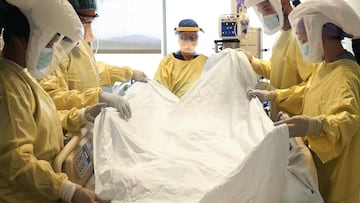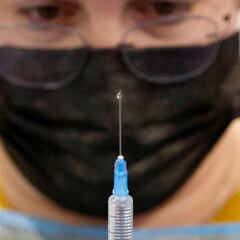Has the American healthcare system collapsed?
As the covid-19 infection rate and death toll continue to rise, health experts like Dr Anthony Fauci have warned that hospitals are close to breaking point.


Despite positive news about the vaccine roll-out there are a number of signs suggesting that the United States is embarking upon the most dangerous phase of the pandemic to date. Infection rates are continuing to soar across the country and with hospitalisations at a record high many health experts are predicting that the healthcare system will soon be unable to cope with the strain.
The US Covid-19 case count reaches more than 20 million. It took 292 days to hit 10 million and just 54 for that number to double. https://t.co/sBoUt1y0CF
— CNN Breaking News (@cnnbrk) January 1, 2021
President and health officials in disagreement
Throughout much of the pandemic President Donald Trump has been at odds with many in the healthcare profession over the severity of the pandemic. Over the weekend the US surpassed 350,000 coronavirus deaths, with the total number of covid-19 cases topping 20 million, according to data from the Johns Hopkins University of Medicine.
In response to these shocking statistics, Trump sought to downplay the extent of the problem and dismissed the soaring death toll as “fake news” on Twitter.
In response, Dr Anthony Fauci made clear that the reported figures are indeed legitimate and appeared on ABC News’ This Week to encourage Americans to take the pandemic seriously. The US’ leading health official and key member of Trump’s own White House Coronavirus Task Force said “The deaths are real deaths”.
He continued: "I mean, all you need to do is to go out into the trenches, go to the hospitals, see what the health care worker are dealing with," said Dr Fauci . "They are under very stressed situations. In many areas of the country, the hospital beds are stretched, people are running out of beds, running out of trained personnel who are exhausted right now. That's real. That's not fake."
Record hospitalisation in the US amid surging case numbers
As the US surpassed 20 million confirmed cases of coronavirus the nation’s hospitals were unsurprisingly feeling the strain. On Friday the daily hospitalisation record (the number of Americans needing hospital treatment due to covid-19) was broken for a fourth consecutive day. Data from the Covid Tracking Project showed that over 125,000 were in US hospitals.
In some areas the problems are even more pronounced with California currently on the “brink of catastrophe” according to Dr Christina Ghaly, the state’s health services director. Over the weekend six California hospitals have required an overhaul of their oxygen delivery systems as the number of coronavirus patients requiring respiratory assistance soars.
I hear hospitals in LA are resorting to setting up ICU beds in the cafeterias, hallways, &hospital chapels.Some hospitals over 100 percent capacity. Wait 2weeks after all the reckless fools partied tonight & spread the virus & it will unsustainable. Poor health care workers.
— Lea Black (@LeaBlackMiami) January 1, 2021
Mark Ghilarducci, the director of the Governor’s Office of Emergency Services, has outlined the work required in the last week alone to keep up with the rising case numbers:
"The State of California is continuously working to support our hospitals and protect the lives of Californians impacted by covid-19. By working to upgrade challenged oxygen delivery systems at these older hospitals, we can improve the ability to deliver life-sustaining medical care to those who need it.”
Wider cost of hospital collapse could be devastating
Health experts have been keen to point out that the increase in hospitalisations will affect far more than just those who are infected with the coronavirus. As well as the increase in demand for hospital beds, sections of the building will have to be separated off to avoid the risk of cross-contamination so the actual capacity of hospitals is reduced.
Dr Brad Spellberg, chief medical officer at the Los Angeles County Medical Center, told CNN of the knock-on effects of a sustained rise in hospitalisations.
Yesterday @SamaritansPurse set up tents for a 30-bed Field Hospital in Caldwell County, NC, at the request of 5 medical centers in the surrounding area. With the spike in COVID-19 cases, our doctors, nurses & medical staff will be treating non-ICU COVID patients sent to us. pic.twitter.com/eZDfYnyJFX
— Franklin Graham (@Franklin_Graham) January 3, 2021
"If you are in a car accident, you're going to want us to save your life," he said. “If you have a heart attack or a stroke, you're going to want to an ICU bed with trained ICU nurses and physicians who are not caring for 20 other patients at the same time."
Related stories
After an increase in Thanksgiving travel caused a December spike health officials are extremely concerned about the consequences of gatherings over the Christmas period. With hospitalisation at record levels and infection rates still high, Dr Spellberg has called on the public to be more aware of the precarious state of the healthcare system.
"This is about total collapse of the health care system if we have another spike," Spellberg said. "And we, in the hospital, cannot stop that. We can only react to it. It is the public that has the power.”

